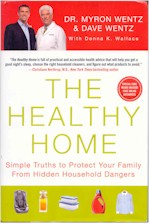 |
|
|
| ||||||
|
|
This page is the original source of this review, though you may also find it on Amazon or other sites. | ||
| Book Reviews Home | Free Audio Books | |
 |
Book Review of: The Healthy HomeSimple Truths to Protect Your Family From Hidden Household Dangers Price: $14.95 Availability: Usually ships
within 24 hours |
| Review
of
The Healthy Home, by Dr. Myron Wentz, Dave Wenz, and Donna K. Wallace(Hardcover, 2011) (You can print this review in landscape mode, if you want a hardcopy) Reviewer: Mark Lamendola, author of over 6,000 articles. This book can change your life. This is an easy to read book that provides excellent advice on a key aspect of preventing illness and premature death. I'm qualified to say that, because despite having an immune deficiency I have not been sick since 1971. Dr. Wentz, Dave Wentz, and Donna K. Wallace are right on target, throughout this book. This book shows you how to reduce the toxicity of your home to tolerable levels, greatly reducing a long list of risk factors for debilitating and costly illnesses. It touches, also on that tripod of diet, rest, and exercise. The advice it offers is excellent for several reasons:
Another way this book stands out is there is no fluff. By that, I mean the authors don't waste your time with "advice" that is unlikely to be of any use. Nor do they try to tell us that we need to go back to the stone age or do anything else that is impractical. I'm tempted to provide examples, but I'd rather you read the book for yourself so you can enjoy the wealth of information in it, plus enjoy the health benefits of following what Dr. Wentz advises. If the federal government actually wanted to reduce medical costs and fix the Medicare cost problem, it would issue a copy of this book to everyone who files a tax return. That small investment would save the public treasury billions of dollars per year, assuming the recipients read this marvelous book and followed even half of its sensible advice. This book is nicely laid out, with a typeface that's actually large enough for an adult. It seems like a quick read, even though it's packed with information. It consists of 6 chapters and two epilogues in 250 pages. It contains nice graphics and informative sidebars. Especially helpful are the frequent questionnaires that help the reader grade how well s/he is doing in a particular area. These are short, but illuminating. I am writing this review about a week after my father died from causes that adherence to this book would have prevented. Sure, buy a copy for yourself and refer to it weekly. But get a copy for someone else, too. The greater the number of people following the advice in this book, the more all of us win. | |
About these reviewsYou may be wondering why the reviews here are any different from the hundreds of "reviews" posted online. Notice the quotation marks? I've been reviewing books for sites like Amazon for many years now, and it dismays me that Amazon found it necessary to post a minimum word count for reviews. It further dismays me that it's only 20 words. If that's all you have to say about a book, why bother? And why waste everyone else's time with such drivel? As a reader of such reviews, I feel like I am being told that I do not matter. The flippancy of people who write these terse "reviews" is insulting to the authors also, I would suspect. This sound bite blathering taking the place of any actual communication is increasingly a problem in our mindless, blog-posting Webosphere. Sadly, Google rewards such pointlessness as "content" so we just get more if this inanity. My reviews, contrary to current (non) standards, actually tell you about the book. I always got an "A" on a book review I did as a kid (that's how I remember it anyhow, and it's my story so I'm sticking to it). A book review contains certain elements and has a logical structure. It informs the reader about the book. A book review may also tell the reader whether the reviewer liked it, but revealing a reviewer's personal taste is not necessary for an informative book review. About your reviewer
About reading styleNo, I do not "speed read" through these. That said, I do read at a fast rate. But, in contrast to speed reading, I read everything when I read a book for review. Speed reading is a specialized type of reading that requires skipping text as you go. Using this technique, I've been able to consistently "max out" a speed reading machine at 2080 words per minute with 80% comprehension. This method is great if you are out to show how fast you can read. But I didn't use it in graduate school and I don't use it now. I think it takes the joy out of reading, and that pleasure is a big part of why I read. |
| |||||